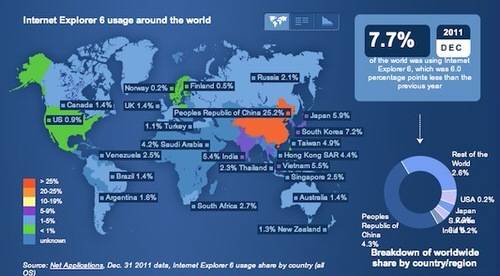Today the Internet bids another goodbye to Internet Explorer 6, whose U.S. death is inevitable. New data from Net Applications shows that less than 1% of U.S. Internet users choose IE6 as their browser of choice. And when it comes to the mobile/tablet browser market share, only 0.41% use some variation of Internet Explorer, period. iOS devices come with pre-installed Safari browsers, which make for 53.3% of the mobile browser market. Meanwhile, Opera Mini and an Android browser account for 21.66% and 15.87% of the mobile market, respectively.

Browser trends from Sitepoint showed some IE6 death signs just a month ago, noting that more people browsed the Web on their smartphones than used IE6 and IE7 combined.

Yet, little more than one year ago, IE6 was still the third most popular browser in the world. At the time, companies were lazily using IE6 as a means of social control – social networking sites were nearly inaccessible through the dinosaur browser. This was all despite the ridiculous security risks it posed. Yet, at the time, the future of IE6 was still up for debate.
Web developers, designers and regular users noticed that IE6 was on the decline earlier last year, with only 2.9% of the U.S. Internet using IE6. At the time, the highest number of IE6 users were located in Asia.
WordPress.com stopped supporting IE 6 last May and YouTube stopped supporting it back in early 2010.
Even Microsoft apologized to developers about that whole “wasting time on building stuff for IE6” thing. The company began automatically upgrading Internet Explorer on Windows 7, Vista and XP.
Regardless of how you feel about IE6, data shows that the end is near.

















